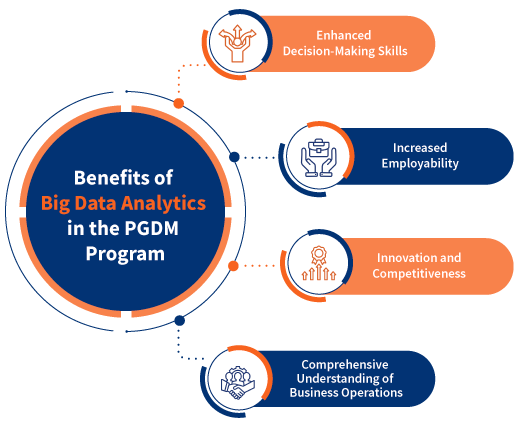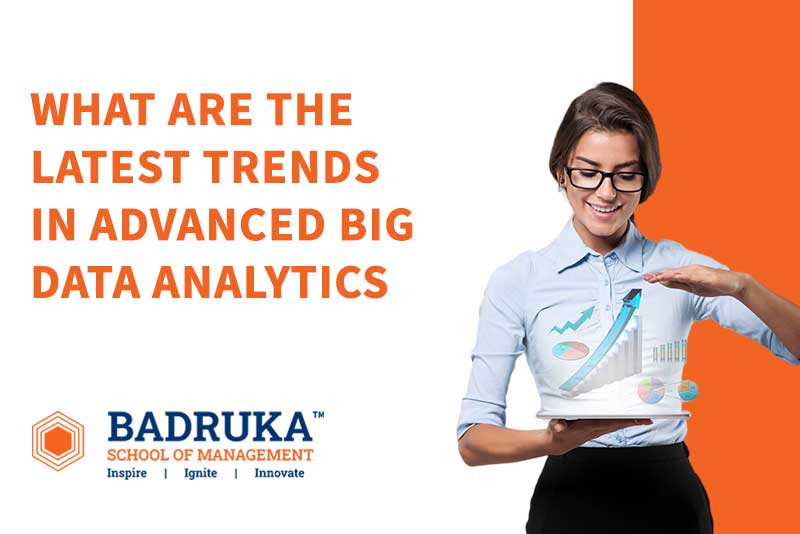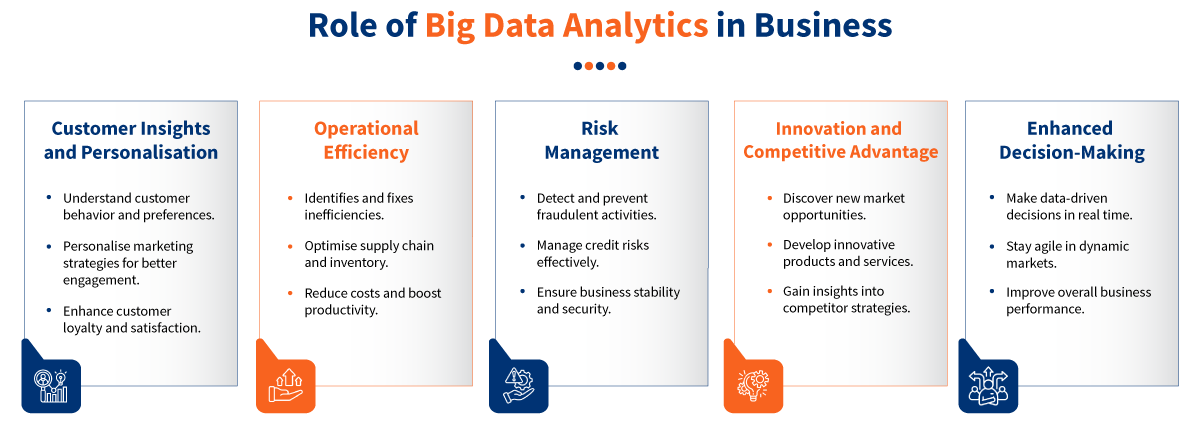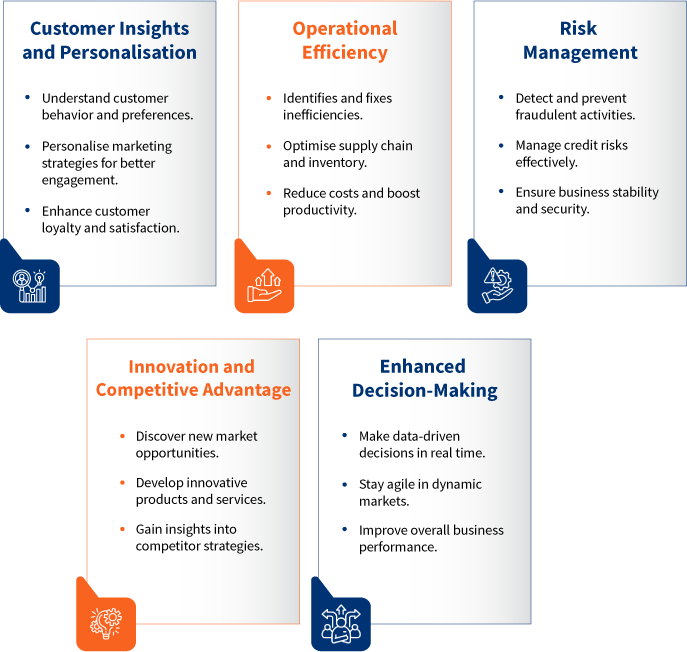Advanced Big Data Analytics refers to the sophisticated techniques and tools used to analyse large and complex datasets to extract deeper insights and drive more precise decision-making. It goes beyond basic data processing and analysis by employing cutting-edge methodologies and technologies to handle big data’s volume, velocity, variety, and integrity.
Mastering big data analytics is essential for students pursuing a Post Graduate Diploma in Management (PGDM) to become effective, data-driven leaders.
The Role of Big Data Analytics in Business
Big data analytics involves examining large datasets to uncover hidden patterns, correlations, and insights. By leveraging advanced analytics techniques, businesses can make informed decisions, optimise operations, and predict future trends. Integrating big data analytics in business strategies enables companies to stay competitive and innovative.
Here are key areas where big data analytics impacts business:
1. Customer Insights and Personalisation
Big data analytics enables businesses to understand customer behaviour, preferences, and trends. This information is crucial for personalising marketing strategies, improving customer experiences, and increasing customer loyalty. By analysing customer data, companies can tailor their products and services to meet specific needs, leading to higher satisfaction and retention rates.
2. Operational Efficiency
Analysing large datasets helps identify inefficiencies and areas for improvement within business operations. This can lead to cost reductions, streamlined processes, and enhanced productivity. For instance, supply chain management benefits from big data analytics by optimising inventory levels, predicting demand, and reducing waste.
3. Risk Management
Big data analytics is vital for identifying and mitigating risks. Financial institutions, for example, use analytics to detect fraudulent activities and manage credit risks. By analysing patterns and anomalies in data, businesses can proactively address potential risks, ensuring stability and security.
4. Innovation and Competitive Advantage
Businesses leverage big data analytics to drive innovation. By uncovering new market opportunities and consumer needs, companies can develop innovative products and services. Analytics also provide insights into competitor activities, allowing businesses to stay ahead in the market.
5. Enhanced Decision-Making
Data-driven decision-making is one of the most significant benefits of big data analytics. Real-time data analysis provides businesses with up-to-date information, enabling quick and informed decisions. This agility is crucial in dynamic markets where timely decisions can be the difference between success and failure.
Latest Trends in Advanced Big Data Analytics in a PGDM Curriculum
1. Machine Learning and Artificial Intelligence Integration
Machine learning (ML) and artificial intelligence (AI) are integral to modern data analytics. PGDM programs teach students to build and implement ML models, enabling automated data processing and predictive analytics.
These technologies allow businesses to analyse large datasets quickly and accurately, uncovering patterns and trends that were previously undetectable. AI-driven models can predict customer behaviour, optimise supply chains, and improve operational efficiency.
Learn more: How AI is shaking things up in business & how B-schoolers can prepare?
2. Augmented Analytics
Augmented analytics uses AI to automate data preparation, insight generation, and insight explanation. This technology simplifies the analytics process, making it accessible to non-technical users. By reducing the complexity of data analysis, augmented analytics democratise data-driven decision-making across organisations. Tools in this domain help users uncover insights without deep technical expertise, promoting a data-centric culture.
3. Data Management and Warehousing
Effective data management involves storing, organising, and retrieving data efficiently. Students gain hands-on experience with data warehousing solutions, ensuring they can manage large volumes of data seamlessly.
4. Real-Time Data Processing
Real-time data analytics enables businesses to process and analyse data as it is generated, providing immediate insights. This capability is crucial for industries that require timely decision-making, such as finance, healthcare, and e-commerce. Technologies like Apache Kafka and Apache Flink facilitate the handling of live data streams, allowing organisations to respond swiftly to emerging trends and events.PGDM curriculum include training on real-time data processing tools and techniques, preparing students to handle dynamic data environments.
5. Edge Computing
Edge computing involves processing data closer to the source of data generation, such as IoT devices, rather than relying on centralised data centres. This approach reduces latency and bandwidth usage, making analytics faster and more efficient. It is particularly useful for applications requiring real-time analytics and immediate responses, such as autonomous vehicles and smart grids.
6. Blockchain Technology
Blockchain offers a secure and transparent method for recording transactions and managing data. Its decentralised nature ensures data integrity and prevents tampering, making it ideal for sectors like finance and supply chain management. Blockchain can enhance data security, streamline operations, and build trust among stakeholders by providing an immutable record of transactions.
Learn more: Understanding Blockchain Technology
7. Ethics and Data Privacy
With the increasing importance of data, ethical considerations and data privacy are paramount. PGDM programs emphasise the importance of ethical data use and teach students about regulations and best practices in data privacy.
Benefits of Big Data Analytics in the PGDM Program

1. Enhanced Decision-Making Skills
By learning advanced analytics techniques, students develop the ability to make data-driven decisions. This skill is invaluable in navigating complex business environments and driving strategic initiatives.
2. Increased Employability
Proficiency in big data analytics significantly enhances employability. Organisations across various industries seek professionals who can leverage data to drive business growth, making this skill set highly desirable.
3. Innovation and Competitiveness
Knowledge of big data analytics fosters innovation. Students are equipped to identify new opportunities, optimise processes, and create competitive advantages for their organisations.
4. Comprehensive Understanding of Business Operations
Integrating big data analytics provides a holistic view of business operations. Students learn to analyse data from different departments, leading to more cohesive and efficient business strategies.
Conclusion
Big data analytics is a cornerstone of modern business strategies, and its significance in a PGDM curriculum cannot be overstated. By mastering big data analytics, PGDM students are well-equipped to become data-driven leaders, capable of making informed decisions, driving innovation, and maintaining a competitive edge in the business world.
Are you ready to transform into a data-driven leader? Explore the BSM PGDM programme and gain expertise in big data analytics. Enrol now to elevate your career and make impactful business decisions.
BSM Post Graduate Diploma in Management Programme






